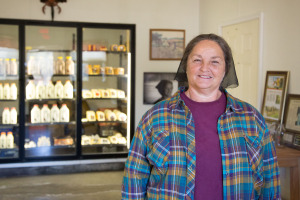Small dairy farmer battles Florida regulators over ‘misleading’ milk labels

By William Patrick | Florida Watchdog
MISLEADING?: Mary Lou Wesselhoeft, a third generation dairy farmer, is battling state regulators with the help of the Institute for Justice, a public interest law firm.
TALLAHASSEE, Fla. — State regulators took on a third generation family-owned dairy farm in one of Florida’s smallest counties and gave it an offer the owners had to refuse: call a natural milk item imitation milk or inject it with additives.
When Mary Lou Wesselhoeft, owner of the Ocheese Creamery, didn’t comply, the result was a stop sale order issued by the Florida Department of Agriculture and Consumer Services.
That was two years ago.
Now, Wesselhoeft is taking on regulators with the help of the Institute for Justice, a public interest law firm. A federal lawsuit filed last week accuses state officials of infringing on the small business’s First Amendment rights by forcing it to mislead its customers.
In 2012, new food labeling regulations no longer allowed the Ocheesee Creamery’s natural pasteurized skim milk to be called “pasteurized skim milk.” Instead, state officials insisted the creamery call it “Non-Grade ‘A’ Milk Product, Natural Milk Vitamins Removed.”
Wesselhoeft, a Calhoun County resident, said the labeling requirement is confusing and inaccurate.
The only other option was to artificially inject its popular product with vitamin A, effectively undermining the essence of the small business, the lawsuit explains.
Wesselhoeft has for years produced dairy products in ways similar to her family forebearers: glass bottles, grazing grass fed cows and hard work. A Bible verse on creamery’s websites reads, “‘The hills shall flow with milk,’ Joel 3:18.”
The three-employee farm also includes a storefront where guests can peek at how the family bottles its milk.
“Many older people enjoy our items because it reminds them of their growing-up days when milk in glass bottles was the norm,” reads the Ocheesee Creamery website.
But when regulators changed the rules, one of the creamery’s signature items legally became imitation milk.
Natural skim milk is produced by skimming cream off the top of whole milk. The cream contains vitamin A. Since most of the vitamin A is lost in the skimming process, regulators determined Wesselhoeft’s skim product no longer met government standards.
“Your skim ‘milk’ product is therefore nutritionally inferior to the federal standard of identity for ‘milk’ making it less than Grade ‘A,”’ states a Dec. 2013 letter from Gary Newton, head of the state Bureau of Dairy Industry.
Wesselhoeft asserts her product never changed, only the rules.
“The government is censoring me from telling my customers what is in the milk they want to buy,” she said in an IJ statement. “I have a right to label the skim milk I want to sell as exactly what it is: pasteurized skim milk.”
According to the lawsuit, Wesselhoeft offered alternate labels, including “Pasteurized Skim Milk: No Vitamin A Added,” and “Pasteurized Skim Milk: Most Vitamin A Removed by Skimming Cream from Milk.”
The suggestions were denied, but not without a cost.
The farm continues to sell dairy items containing cream, but since the left over skim milk cannot be sold, it’s discarded.
Last month, officials said they would compromise and allow the phrase, “The State requires us to call this,” normally required to be printed ahead of the official skim milk label, to be optional.
“Ordering businesses to confuse their customers is nothing more than flat-out censorship,” said Justin Pearson, managing attorney of IJ’s Florida office. “And consumers suffer when the government forces businesses to replace simple and truthful information with confusing words.”







